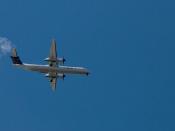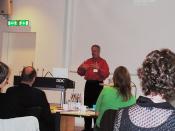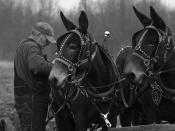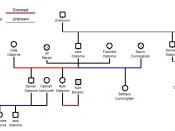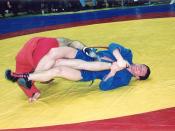Little Porter Osborne, Jr. grew up on a farm in Georgia where the people own the land and the land, in turn, owns the people. In the novel, Run with the Horsemen, Porter fights his way through adolescence and the depression, learning more about life every day from the big boys under the tree at lunch. Ferrol Sams is able to portray a realistic account of life on a farm during the depression by using humor, dialect, and vivid imagery.
Humor is used throughout the book to keep the reader interested in what would otherwise be a boring story of hard work and hard times. The boring and tedious act of plowing is turned into a dangerous, yet humorous, occurrence when a release of methane gas from the mule was met by a match that Porter happened to be holding in close proximity to the rear of the animal.
This resulted in a flame that "hissed and crackled and had long, feathery projections on the upper side of it, and it kept on and on and on and was altogether awe-inspiring to witness." Another device used throughout the novel to give a sense of authenticity is diction. Although the members of the Osborne family speak properly, the farm hands (who were, up until a short time before the novel, slaves), speak in a southern dialect which portrays them as uneducated. A good example of this is when Buddy pleads with Porter to, "Keep yo head down, Sambo! For God's sake, keep yo head down an be stiller'n you ever been in yo life befo!" The same words are used as would be used by an educated person, only they are shortened or run together.
The vivid imagery used throughout the novel allows the reader to have a better idea of what life was like. The summer plowing is said to have a rhythm that is "almost musical," The stride of a man "matched that of a mule in a one-plane dance down a cotton row with ears of the mule plunging forward then backward in unison with the pull of the forelegs, now the hind legs, as the heavy plow was dragged smoothly through the whispering earth." This passage allows the reader to imagine the rhythm of the plowing, which makes it seem more real than just saying that the mule plowed up and down the row. All this plowing happened as, "Over and above and beyond and around could be heard bird song." The imagery of a man plowing in the heat with birds singing away comes to mind, and the scene is real.
Run with the Horsemen very accurately describes farm life during the depression through the use of humor, diction, and imagery. All of these elements are used to tie the story together, and make it an entertaining piece of fiction with realistic elements.

